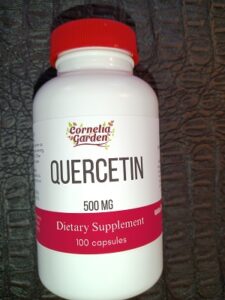Quercetin is a plant flavonoid found in a variety of fruits, vegetables, and herbs. It is known for its antioxidant and anti-inflammatory properties, and it has a variety of potential health benefits. Here are just a few:

- May have anti-inflammatory effects
Quercetin is a powerful antioxidant that may help to reduce inflammation in the body. Inflammation is a normal immune response, but chronic inflammation has been linked to a variety of health problems, including heart disease and cancer.
- May improve respiratory health
Quercetin may have a variety of respiratory health benefits. It has been shown to reduce symptoms of allergies and asthma, and it may also help to reduce the severity and duration of colds and other respiratory infections.
- May support heart health
Some research suggests that quercetin may have a positive effect on heart health. It may help to lower blood pressure, reduce cholesterol levels, and improve circulation.
- May have anti-cancer effects
There is some evidence to suggest that quercetin may have anti-cancer effects. It has been shown to inhibit the growth of cancer cells in some studies, and it may also have a protective effect against certain types of cancer. However, more research is needed to fully understand the potential anti-cancer effects of quercetin.
- May improve brain health
Quercetin may have a variety of benefits for brain health. It has been shown to improve memory and cognitive function, and it may also have a protective effect against neurodegenerative diseases, such as Alzheimer’s disease.
Overall, quercetin is a plant flavonoid with a variety of potential health benefits. It is a powerful antioxidant and anti-inflammatory, and it may have a positive effect on respiratory health, heart health, brain health, and more. Some good sources of quercetin include apples, berries, onions, and green tea.
